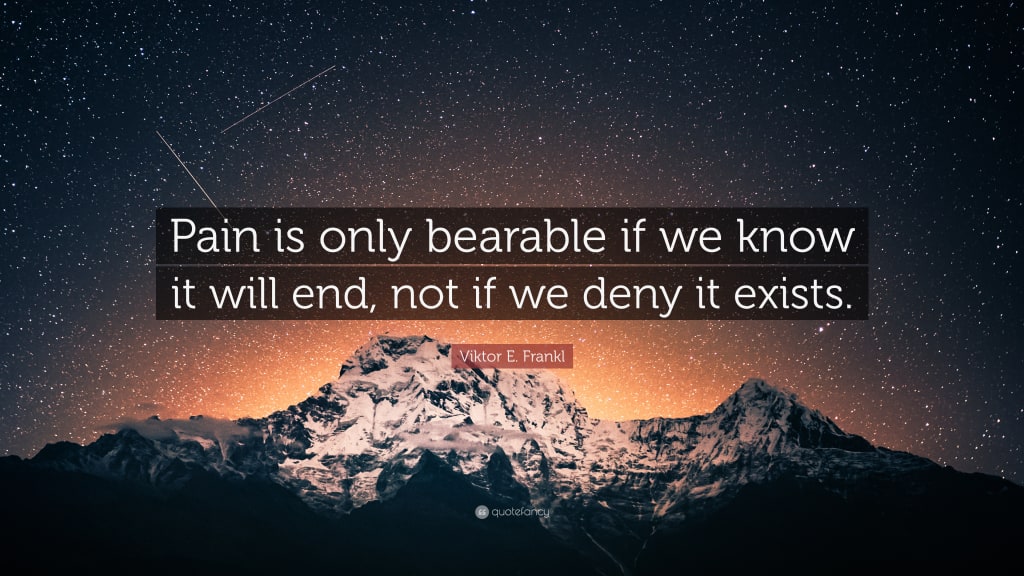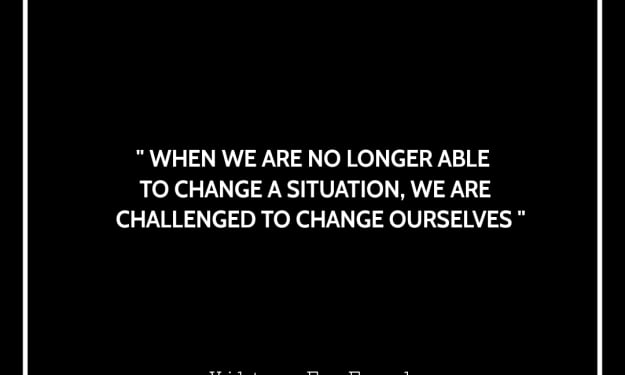Suffering: The Series
Part 1: What is the definition of Suffering and Pain, and why does it matter?

Alright, so let's start with some definitions here. According to Google, pain and suffering are defined as follows:
Pain: physical suffering or discomfort caused by illness or injury.
Suffering: the state of undergoing pain, distress, or hardship.
Right away, what strikes me as interesting about these two definitions is the fact that they apparently cannot be defined without including each other in the definition. This is to say, that according to our English language, a person who is experiencing pain is necessarily also experiencing suffering, and a person who is suffering is also experiencing pain.
Ultimately, I can't find much to refute about that. If you break your leg, you will experience pain, and until that break is heal, you will be suffering through the pain of a broken leg. It certainly makes sense from a linguistic standpoint, and from a therapeutic standpoint, it holds true as well.
My clients who come to me reporting symptoms of emotional pain--depression, anxiety, grief, etc--could certainly say to me, "I am suffering from mental illness," and I wouldn't try to correct them or reframe it even, it just makes sense.
Let's go further. Suffering, according to Google, may include hardship or distress as well. Those words are defined as such:
Distress:
1. extreme anxiety, sorrow, or pain.
2. the state of a ship or aircraft when in danger or difficulty and needing help.
3. suffering caused by lack of money or the basic necessities of life.
Hardship: severe suffering or privation.
Again, neither can be defined without suffering to qualify them, and vice versa. At least in terms of lexicon, an English speaking person is unable to conceptualize suffering and pain without imagery or connotation of hardship, distress, sorrow, anxiety, etc, because of how they evidently qualify each other.
Why am I caught on words and definitions? Simply because in my existence as a therapist and also someone who has an obsession with words and their connotations, I have come to learn, know and witness the effect of words that a person chooses to use on how they experience the situations and conditions they live through.
For illustration, here are some graphs (also from Google) showing the prevalence of usage of the words above over time, up to the year 2019.


What do we notice here? For one, apparently those in the 1950 through, say, 2000ish era weren't using these words nearly as much those in the time frames surrounding them.
When a word decreases in a language over time, you could probably wonder, reasonably, if it has to do with the introduction of new words or vocabulary that expresses the same thing. For example, if a child stops using the words "I'm mad" it's conceivable that the child has learned to specify more with words such as, "I am upset because things are not going the way that I want." This is the idea of word substitution.
Substitution could explain why the 50's, 60's and so on to 2000 stopped using those words as often, from a certain standpoint. Therapy and psychotherapy in America started to really increase and become utilized on a larger scale than before, so certainly people had the opportunity to learn new ways to express the concepts of pain and suffering beyond the statement "I am in pain" or "I am suffering."
But then again, therapy was new still, and it wasn't like people were lined up out the door for it in the beginning. And, presumably, even without that being the case, you might expect the decrease of those words to mean an increase of opposite words, such as "happiness," or "peace."
Let's look at those words.


See what I'm seeing? Use of the word "happiness" is perhaps lower in that half a millenia than that for the words "pain" and "suffering" was trending. People in those times were not using words like pain or suffering, but they also weren't using words such as happiness either.
Looking at the word peace, however, might give us a different avenue of thought, specifically that of what was being experienced, and how that affected use of words within that time period.
Question for you. If you ran a graph of your own language over your life time and found that in one area of your life you were using words like peace more than the words pain or suffering, what would you assume about your life at that time? Probably, and very reasonably, that in that time, nothing was happening to you in that time that was cause for pain, suffering, etc, and therefore, your language reflected that.
I would grant you that, it certainly would make sense.
One more graph for us to look at.

Any guesses as to what this graph represents? Love? Health? Stability?
If your guess was any of these words, or anything related, unfortunately you are incorrect.
This graph represents the use of the word "war. "
If your memory for history is as inconsistent as mine, I'll fill you in. During the 1950's, America was occupied by talk, implementation and all other dealings surround the Korean War.
So, yeah, people were talking about peace more than anything because at the time, war, it's opposite, was heavy on the minds of the government and the American people at large.
Enter the concept of word opposition, this being the idea that the absence or decrease of a word in time signifies that the current mindset of the population is preoccupied with what it doesn't have, what it believes is necessary to be spoken about, etc. This is to say that, in some cases, a word is used less when there is more reason to use it because the human mind is looking to identify and solve the issue of it being there by pursuing its opposite. In this case, talk of peace was greater than talk of pain and suffering because there was a lack of peace; There was no need to talk about pain and suffering because it was something that was obviously present, to the point where talking about it was a moot point.
If I don't have a job, I'm more likely to be occupied with thoughts of financial stability. I can certainly think and talk about not having a job, but my preoccupation will be centered around the pursuit of financial stability, the opposite of the thing I have.
Again, why bring this up? So the people in the 1950's used words like war and peace more often then pain and suffering--what's the big deal?
Two things.
One, words are, have always been and will always be important when it comes to a person's perception of their current experience and what meaning there is within it. If a graph shows that in a time of war, people were talking about it's opposite, a positive opposite, at that, more than the obvious negative effects of the situation, it says a lot about the ability of the people at that time to make meaning out of a situation which involved a great deal of pain and suffering and focus on the solution, the goal, the positive outcome, rather than the negative realities and reasons to dwell on them.
Even stepping out of the 50's and going back toward the 20's and 30's, where we have the Great Depression and World War II, the graphs don't change. There is still, generally speaking, less negative vocabulary in those times than there are apparently in current times, even though we as a country aren't in a world war, nor are there any known replications of the Holocaust either.
Which is point number two. What do these graphs indicate about what a society believes is suffering, pain, war, etc? If the change is best explained by word opposition rather than substitution, does that mean the rise of the use of suffering and pain indicates more of a preoccupation with those words in recent times than before? And, if that is true, why have the numbers jumped higher than they have been since the 1800's when there were more larger movements of oppression, segregation, slavery, etc?
Maybe, as a people, we've grown soft, sensitive, unable to differentiate between trivial inconveniences and socially and historically validated reasons for feeling pain and suffering.
Or maybe the fact is that after centuries of humanity deciding what suffering should mean, we are finally starting to realize that our past ideas and perception of what it means is not only inaccurate, but has created generations of humans who now have no choice but to process the negative results of it handed down from generations of those forced to live under the weight of emotional torment because of it.
Because, let's face it. We don't have a world war II on the homefront, nor do we have concentration camps anywhere (that we know of), and slavery has been outlawed for many many decades--and yet, people are still suffering. People are still dying based on a prejudice of color, race, religion--really, any identity those responsible do not agree with--which is to say, that after generations of "positive change" we are still somehow dealing with scars from sufferings from long ago.
My thought, which will be continued in a future article, is that any and all change has been made in the past generations to alleviate these societal sufferings has been a band-aid over a bullet hole. Sure, doing away with segregated bathrooms is great, but it doesn't heal the agony and suffering of the people who it applied to.
What we're dealing with not is a tragic misunderstanding of what suffering is, how to talk about it and process it, how to resolve it, and how to be sure the same suffering is not repeated.
More on this to come next week--feel free to leave comments, critiques, points of view, etc, and of course please share as much as you can!
About the Creator
Alicia Summers
Hey there! Just a 20 something from Colorado trying to make a difference both in my mental health therapy practice and in my writings and musics as a regular human as well! Thanks for taking a look at my page, I hope to see your feedback!






Comments
There are no comments for this story
Be the first to respond and start the conversation.